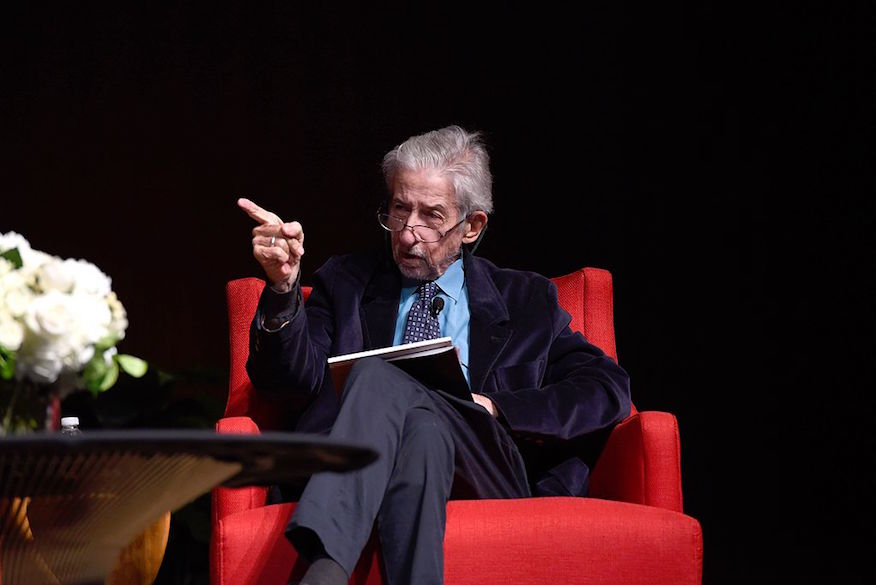 Tom Hayden, politician and anti-Vietnam War activist. April 27, 2016. Photo courtesy of Wikipedia
Tom Hayden, politician and anti-Vietnam War activist. April 27, 2016. Photo courtesy of Wikipedia
It was part memorial, part movement rally, part testimonial, part reunion. Most of the thousand or so gathered this past Sunday afternoon at UCLA’s Royce Hall were grey( not greying) boomers, though a younger cohort also showed. The sense of satisfaction in recalling a life of consequence, together with others who’d been there, was palpable. And there was this surprising occurrence: In an almost three hour event, during which a dozen plus speakers ( bold face names among them) held forth, each tethered to the port side of American politics, not once was the name of the current president mentioned.
The omission wasn’t an evasion; it was testimony to the man we came to remember and what he was about. On Sunday “Keep your eyes on the prize” was a watchword, for few had done it better than he.
Happily mingling in this congregation of joy: Onetime gang members (whose lives he had rescued and rearranged); his former students (ditto on the rearranged lives, maybe the same for the rescuing part); film and theatre people; academics and writers; political activists, including comrades from the Sixties and the California State Legislature, both; his family; and lots and lots of friends from many walks. He had changed the lives of most present– such was the power and personality of Tom Hayden
There was humor and irony (Hayden had both in spades), eloquence and tears. Those who spoke, led by his wife, Barbara Williams, covered the waterfront of a remarkable life: Tom Hayden’s achievements as “a radical American reformer” (in the words of his friend, Steve Wasserman); his contrarian nature, seen early on from Detroit and Ann Arbor days; his relentlessness and prescience, from his work in Georgia to Newark, Chicago to California; overall, his giftedness and singular voice –all evoked with admiration and affection.
Those who didn’t know him didn’t really get it, but Hayden, though often accused of arrogance, didn’t put on airs. Quite the contrary: His way, for example, was to “slink around low to the ground, leprechaun-like”, as his former wife Jane Fonda lovingly put it. We laughed; we all knew that walk of Hayden’s (which I always thought of as the walk of a wary, James Dean-like, outsider). Mostly, we felt fortunate for having known him.
I, for one, have long been intrigued by Tom Hayden’s friendship with the late Senator Robert F. Kennedy, towards the end of Bobby’s life. (Hayden, teary- eyed, joined a small honor guard watching over RFK’s casket at St. Patrick’s Cathedral, at midnight before the next day’s funeral.)
Bobby Kennedy Jr. shed light on the relationship. He told the Royce Hall crowd that his father liked Hayden a lot, seeing in him a kindred Irish spirit. Perhaps most important–this is 1967-68, remember, when the US was waging war in Vietnam while cracking down on dissent at home–Kennedy Jr. noted that Hayden sought to persuade those who would listen that a nation behaving like an imperial power abroad, would not have true democracy at home. Bobby Kennedy was listening (and so too was Martin Luther King Jr.)
Renowned as his Sixties and Seventies exploits were, Tom Hayden was not a man of the past. He was an urgent, though gentle, warrior for his causes, some ongoing, others to emerge—either way, Hayden, eyes ahead, was usually ahead of the crowd, which would eventually catch on.
Which is why, while we were gathered to memorialize him and his time is now gone, this was– and is– Tom Hayden’s moment.
For here we are, an imperious American administration in full tilt, and a Sixties- style movement of popular resistance aborning.
While the resistance is both more and less than a Sixties-like movement, one would guess it will prove large and broad- based, and will shape politics (electoral, included) for a decade or more.
This is so much what Hayden was about, especially in his last years. He agitated and organized, even during the Obama presidency, for a coalition of the many and the diverse for a sharing of the promise of America. When Trump began to rise in 2015, Hayden, always geared up, fearing the worse, geared up higher. He literally spent himself for the cause, as he tended to do.
Though he knew presidents and princes, Tom Hayden ultimately was a man of the streets — the kind of open streets where American democracy best thrives. Now is Tom Hayden’s moment–and it always was.
A final word: Hayden wasn’t a hater. A popular movement that succumbs to hate will soon enough see its promise in pieces and its time gone. Much as Tom Hayden would thrill to the voices of protest today, I suspect he’d counsel a degree of caution that the moment might last and democracy endure.
John Moscowitz is rabbi emeritus, Holy Blossom Temple, Toronto. The author of “Evolution of an Unorthodox Rabbi” (Dundurn Press, 2015), he’s writing a memoir of his activist days when Tom Hayden was his teacher.






















 More news and opinions than at a Shabbat dinner, right in your inbox.
More news and opinions than at a Shabbat dinner, right in your inbox.